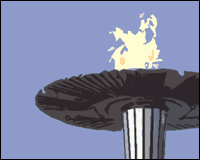The Olympic Games
Created | Updated Aug 23, 2008

The modern Olympic Games have little resemblance to their namesakes, the ancient sporting competitions held at the festival of Olympia in western Greece. Though the essence of the original Games holds true - to provide a place where anyone can compete as a sportsman without larger scale or international rivalries intruding - certain other traditions have fallen out of favour. These traditions include only allowing men to compete, travelling by foot to the games, competing naked, giving laurel wreaths to the competitors, having massive feasts to worship gods... and various other traditions of a bygone era.
But Nowadays
The ancient Olympics were discontinued long before the fall of the Greek Empire and their modern counterparts are quite recent in comparison. Started in Athens in 1896, the brainchild of M Pierre de Coubertain, the modern Olympics were intended as a place where people would compete, irrespective of nationality, to show who was the best in the world. They run every four years on leap years, though the Winter Olympics have split away from the timing with the summer games and run on alternate sets of four years. People would compete for the sake of competing and ideally be honoured by the chance to appear. The games caught the imagination of the world and travelled to Athens for the following second Olympiad four years later. The goal of the majority of sportsmen and women since is to get an Olympic medal in their chosen discipline. The medal has become the ultimate accolade, the pinnacle of sporting achievement.
The Olympic Games are supposed to be impartial to political manoeuvering in the wider world1 making the Olympics the most widely participated in international organisation. It is truly worldwide and has more members than even the United Nations.
Real Torches, Not Flashlights
A link is kept to the original Olympics through the carrying of a torch from the lighting at Olympia2, to the ceremonial torch at the Games. This larger torch will stay lit from the opening ceremony to the closing ceremony. The torch lit at Olympia is run in a massive relay race from Greece throughout much of the world and ends up at the opening ceremony in time for the ceremonial lighting of the Olympic torch. In past years this has been done by an archer firing a flaming arrow at the torch and by the famous heavyweight boxer Muhammed Ali lighting the torch personally. The torch is continuously alight, thanks now to it being gas fired, from the time it is lit until it is put out at the end of the games.
The opening ceremony is a wonderful spectacle; effectively a massive stage show in front of a worldwide audience. It will often show the history of sports or of the host city/nation using some of the best known or most talented artists the country has to offer. Taking hours to complete, make sure you are well stocked up on food and drink before undertaking the task of actually watching it. The ceremony culminates with the arrival of all the teams and the aforementioned torch-lighting.
There Actually Are Games Played
The original sports in the modern Olympics were far fewer than they are today but have since expanded to cover the majority of competitive sports. New sports are constantly being added to or previewed at the Games and older sports revitalised by television coverage or shock results. The recent move away from the amateur nature of the games and allowing professional sportspeople to compete has added further excitement to some of the sports and made it increasingly attractive for companies to sponsor.
Sponsorship is big business for the Olympics. It is said that a successful bid to hold the Olympic Games can revitalise a city more than any other event, save a war effort. The amounts spent on recent Games are astounding, running into billions of pounds sterling. Most of the money comes in through sponsorship by major brands whether for individuals, teams, or the Games as a whole. The amount of television coverage of the Olympics makes sponsorship very attractive as there is often almost 24 hour coverage of the sporting events and thus 24 hour coverage of certain brands.
Ah Yes, the Sports
However, it is the sports that people want to watch. They are all hotly contested - there's no way you're going to walk straight into a winning position from being the only one to turn up. There are a limited number of competitions with only one round - the marathon, 50km walk and Decathlon spring to mind - but most require several rounds of heats before getting to a final. Once there you have the chance to head for one of the top three places and a coveted medal, whether Bronze (third place) Silver (second) or Gold (an Olympic champion).
Medalists get their own little ceremony with the presentation of medals, flowers and the chance to kiss either a very attractive young woman or a wrinkly old person who is in some way associated with the organisation of the games. They then get to stand very still in front of thousands of people and sing their national anthem.
Then after two weeks, everything is over and all the athletes return home for a little rest before preparing to do the same again four years later somewhere else. They do go away, however, proud in the knowledge that they are among the top sportspeople in the entire world.

